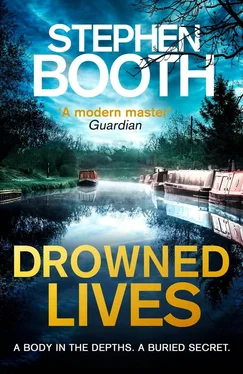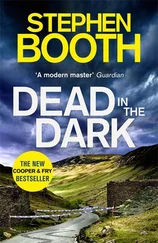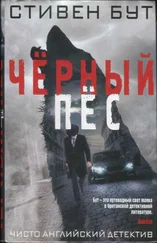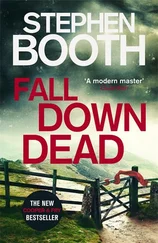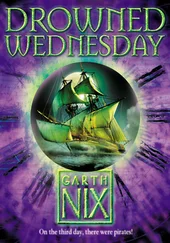‘It’s going to take all day,’ said Sally, leaning across the seats to me as if she suddenly felt she’d known me all her life. ‘Did you realise that? I’ve never heard of a funeral taking so long. Frank has had to take an entire day off work.’
‘I suppose we could sneak off after the service.’
‘No, we can’t,’ said Frank mournfully. ‘We’ve left our car at Hopwas, haven’t we?’
‘That’s a point. So have I. Perhaps we could ask the funeral director to phone for a taxi, and we could share it.’
Frank and Sally looked askance at the old lady, who seemed to be falling asleep. ‘We can’t do that. Obviously, it wouldn’t be respectful.’
‘To whom?’
‘Caroline would be offended.’
‘Ah yes. We don’t want to upset Caroline, do we?’
Sally looked nervous. ‘She seems a bit cool at times, but she’s quite nice when you get to know her.’
I wondered who the old lady was. It would be just my luck if she was Caroline Longden’s aunt, who said nothing but heard everything and had a perfect memory. The Chaplins seemed nervous of her — but perhaps they had no idea who she was either.
‘Do you know Caroline well?’ I asked.
‘She’s Frank’s half-sister,’ said Sally, as if it answered my question.
Frank looked a bit rebellious as we turned the corner at the crossroads in Whittington. ‘She’s a class above us,’ he said. ‘She moves in different circles, if you know what I mean.’
Sally hushed him. ‘She’s away a lot,’ she said. ‘She never wanted to stay in this area. But Samuel was different. He was a lovely old man.’
‘No edge to him at all. So they say.’
‘That’s right.’
The hearse was slowing as it approached the parish church of St Giles. I saw a square tower with a small spire and a building in a hotchpotch of styles.
‘Did you know about Samuel’s project?’ I asked. ‘The book he wanted to publish?’
It was a stab in the dark. But I’d rarely seen anyone’s face change as quickly as Frank Chaplin’s did. He went very white, the blood draining out of his cheeks in a dramatic contrast to his black suit. He stared me at, horrified. Sally noticed his reaction, but was more composed. She reached out to grasp his hand on the seat.
‘A book?’ Frank said. ‘What was it about?’
‘Oh, the history of the Buckley family,’ I said casually, trying to hide my curiosity. ‘I’m carrying on the project for him, actually. Perhaps I could come and see you some time? There might be a few things you could help me with.’
The cars had stopped, and the doors were opened before Frank or Sally could reply. The old lady was helped out first, then the Chaplins. I saw Frank jump as the folding seat I’d been sitting on banged back into place. No doubt about it — he was definitely nervous all of a sudden. Very interesting.
We arranged ourselves into a ragged file and trooped through the churchyard to the porch. Sally passed me, offering her hand to the old lady to help her up the step. I felt a tap on my shoulder, and Frank’s voice close to my ear.
‘Come and see us at the weekend,’ he said. ‘Saturday would be a good day. Thirty-four Cop Nook Lane, Chasetown. We’re in the phone book.’
I nodded, and the next moment we were in the dimness of the church, with a tune playing on the organ. We shuffled into the pews, and I saw that many of the seats were already full for the service.
The funeral held still more surprises for me. For a start, the vicar actually seemed to know the man he was eulogising. This was unlike the service for my father, when the clergyman had asked me for a list of facts to refer to, and had read them out like a bad actor stumbling over his lines.
The man at Whittington wasn’t the incumbent of St Giles, I was told. Yet he spoke of Great-Uncle Samuel as if he’d been an old friend, talking of his successful brewery business, his love of the waterways, his boat Kestrel and the tragedy in his life when his wife Alison was killed. He offered sympathy to Caroline, and gave us the usual line about not being there to mourn a man’s death, but to celebrate his life.
Later, an elderly man with a red face and a large moustache got up and talked about Samuel Longden’s exploits on the waterways. He treated us to anecdotes about the days when Samuel was a novice boater and had wedged his boat firmly sideways across the canal and later grounded it on a weir for three days. He also told a complicated story in which the Captain left his windlass slotted onto the paddle spindle, then nearly sank his boat through a badly fitted weed hatch, whatever that was. He struck just the right note for the members of the congregation behind me, who seemed to be boaters to a man and woman.
The speaker went on to list examples of Samuel’s generosity, both to individuals and to causes he thought were worth supporting, including the restoration of the Ogley and Huddlesford Canal, to which he’d quietly contributed large sums of money for a number of years. He ended with a reference to the South Staffordshire Link Road and how Samuel Longden would feel if it was allowed to go ahead and sever the line of the canal. This brought murmurs of approval from around the church, and roused the congregation to a fine pitch by the time the coffin was carried out.
The time we spent at the actual graveside was mercifully short. Samuel went from dust to dust, ashes to ashes, in the way of all burials. Nobody commented on how ironic it was that a man who had been so concerned with water should be committed to the earth.
But there was one thing that struck home to me, as it did for no one else there. It was something that left me confused about my feelings. For here I was at the funeral of my great-uncle, and I was supposed to be mourning the passing of a relative. Yet the name on the headstone was Longden. At no time during the service did anyone mention this fact — that the man known as Samuel Longden was actually a Buckley.
‘It might be what Samuel wanted, but really...’ said Sally Chaplin as we were ferried back to Whittington Wharf.
The boaters were enjoying themselves now, chatting more loudly as they got back on the boat for the rest of the journey. They knew they were headed for the funeral lunch.
Soon we’d passed through Streethay and under the A38 and were approaching Fradley Junction. For want of anything else to do, I looked for the names of some of the boats moored on the final stretch of the Coventry. There was Lily, Excalibur — and, for some reason, Billabong . One of the men jumped off our boat to operate a little black and white swing bridge that gave pedestrian access to the opposite side of the canal.
Then we’d emerged into the junction and the canal widened out into a rectangular basin, with an enclosed dry dock on one side. Ahead of us was the Swan Inn, a white-walled pub overlooking the junction with the Trent and Mersey. It had china swans in the windows and an Ansells brewery sign over the door, with wooden rails lining a concrete landing area. Benches were set up outside under the arches of a former warehouse where Swan Line Cruisers had its offices. Several more boats were moored in front of the warehouse, painted with green roofs, white cabin sides and red gunwales. They were the Swan Line’s own boats, built for holiday hire.
The scene was peaceful, with no more than the soft lapping of the water as the wind blew it towards the gates of Junction Lock. Some of the people who’d been at the church in Whittington were waiting for us on the mooring. They’d come by car, driving up the towpath side from Alrewas or Fradley.
Inside the pub, a buffet had been laid out in a side room and a crowd of people swarmed around the tables. I held back for a while to allow others from the boat to get in before me. I was still feeling like an unwanted stranger, a sort of Banquo’s ghost at the feast. I had the ridiculous feeling that if I pushed myself forward a bit too hard, if I presumed too much or spoke to the wrong person, then the whole mass of them would turn round and hound me out of the place. They say there’s nowhere more lonely than the middle of a crowd.
Читать дальше
